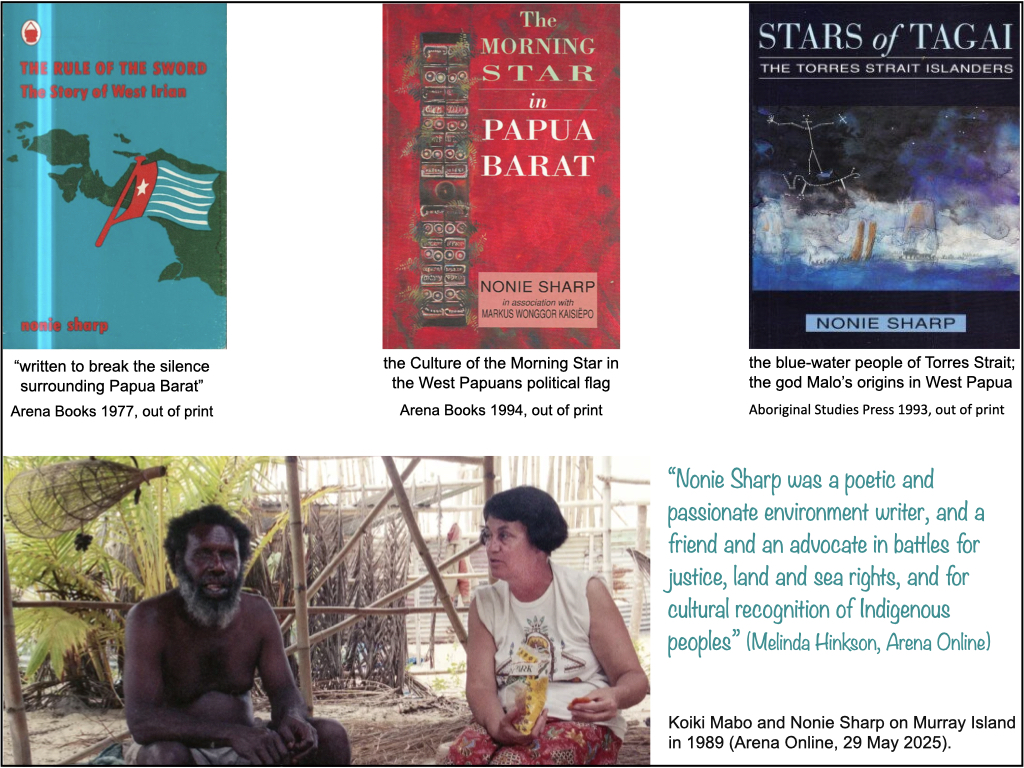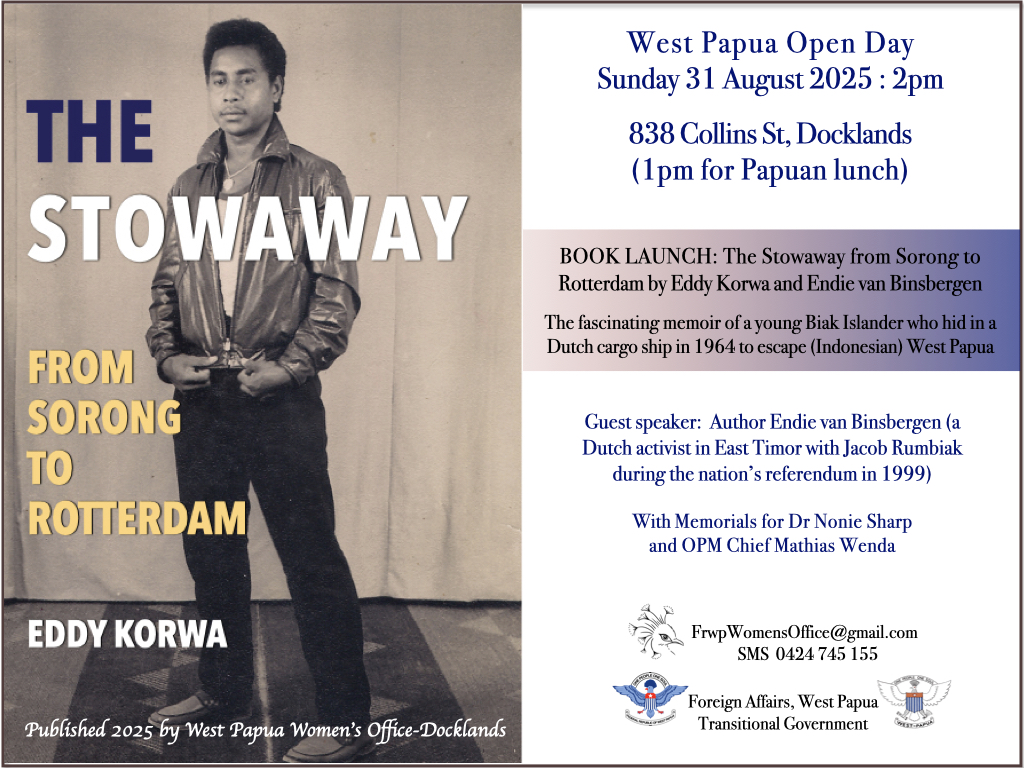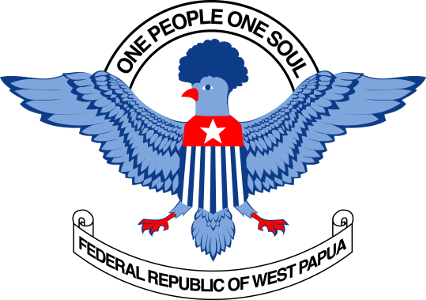 On 31 August 2025, the West Papua office in Docklands held a memorial for Dr Nonie Sharp who died on 9 December 2024. Dr Sharp was an anthropologist who in the 1960s, with husband Geoff and friend Doug White, developed a stream of original commentary and writing on education and Indigenous issues, which ARENA (a think tank they established) published and printed. (Subsequent editors like Gerry Gill, John Hinkson, Paul James, Alison Caddick extended its theoretical approach into economics, media, nationalism and culture, gender and the body).
On 31 August 2025, the West Papua office in Docklands held a memorial for Dr Nonie Sharp who died on 9 December 2024. Dr Sharp was an anthropologist who in the 1960s, with husband Geoff and friend Doug White, developed a stream of original commentary and writing on education and Indigenous issues, which ARENA (a think tank they established) published and printed. (Subsequent editors like Gerry Gill, John Hinkson, Paul James, Alison Caddick extended its theoretical approach into economics, media, nationalism and culture, gender and the body).
Indigenous Australians are indebted to Dr Sharp for her role in overturning the colonial legal doctrine Terra Nullius; West Papuans for The Rule of the Sword (1977) and The Morning Star (1994), and the Australia West Papua Association (1977).
Tribute to Dr Sharp (Louise Byrne, WP Women’s Office-Docklands, 31 August 2025)

“It is said that cultures throw up extraordinary individuals when they really need to. Most of us here today would agreed that Dr Sharp got thrown up when Australia, black and white, and the West Papuans, and their Melanesian kin in Torres Strait, really needed a courageous authoritative academic who cared about producing illuminative and meaningful communiques. When I noticed that Nonie’s three books on West Papua are now out of print, I thought ‘Dr Sharp, you might have been ready, but leaving us on 9 December last year (2024) was not really a very good idea'”.
“Nonie of course was a major force behind Eddy Mabo’s quest to overturn two-hundred years of British and Australian law, and to have Indigenous ownership of land recognised in this country. While the Torres Island men ably presented and defended the case for Indigenous law, Nonie was able to critique and correct enough of the judiciary’s misunderstandings in the Supreme and High Courts to get the job done and make the Commonwealth of Australia a better place.”
“The Rule of the sword (1977) was the first book written about Indonesian West Papua. By then the territory had been an Operational Military Zone for fifteen years; since 1962 when Australia and the other UN Member-states betrayed not only the Papuans but the UN founding principle. Few Australians wanted to know about The rule of the sword because no one really wanted to know what Indonesia was doing to the people inside the Melanesian territory. It was published by Arena, the small think tank that Nonie and her colleagues had established in the 1960s, and printed in an old shed on Nonie and her husband’s rural property. Nonie, always as much activist as academic, then founded the first Australia West Papua Association to maintain the flow of information on Indonesian militarism and the West Papuans courageous resistance.”

“As effectively as The Rule of the Sword focussed on Papuan resistance to colonialism, The Morning Star addressed the fundamentals of their nation-making. Nation-making is about building the structures and institutions that allow a nation to function and thrive. It requires recognising the cultural within the political, a way of thinking-being-researching-writing pioneered in Australia by Nonie and her Arena colleagues. Her inquiries about the design of the Morning Star flag and why West Papuans keep raising it took years. Unsurprisingly, it’s not all about Indonesian brutality.”
“The rule of the sword was, ultimately, about Indonesia in West Papua, and The Morning Star was, ultimately, about West Papuans in their ancient homeland, The Stars of Tagai explored relations between Papuans and the peoples of Torres Strait. If you visit Centrelink, or Parliament House, you will see the Torres Strait flag as well as the Australian Aboriginal flag, and if you’ve read Stars of Tagai you will know why. The Islanders are closer to the West Papuans than to the Indigenous of the Australian mainland because their celebrated god, Malo, journeyed from the Marind tribe in West Papua and gave them the laws and ceremonies to govern their lives.”

“I could talk about Nonie’s research forever, but to finish today, let it be known that another hero ancestor, Nyungu, followed the Malo’s maritime odyssey from West Papua, and every year since the seasonal migration of the Torres Strait Pigeon reminds us of the essential connections between Papua, the Torres Strait Islands, and the Australian mainland. Dr Joe Toscano is in our midst today. He knows all this very well. His beloved wife Ellen Jose was a Torres Strait Islander, famous around the world for her art, and most beloved by West Papuans for founding this office.”
“Let’s reflect for a minute on all that Dr Sharp was and did during this salute from the Mamuna tribe in the highlands of West Papua.”
Song of the Mamuna tribe from Yahukimo, West Papua (1-min video)
https://www.youtube.com/watch?v=2RfsK4AgMOo

On 31 August 2025, t
